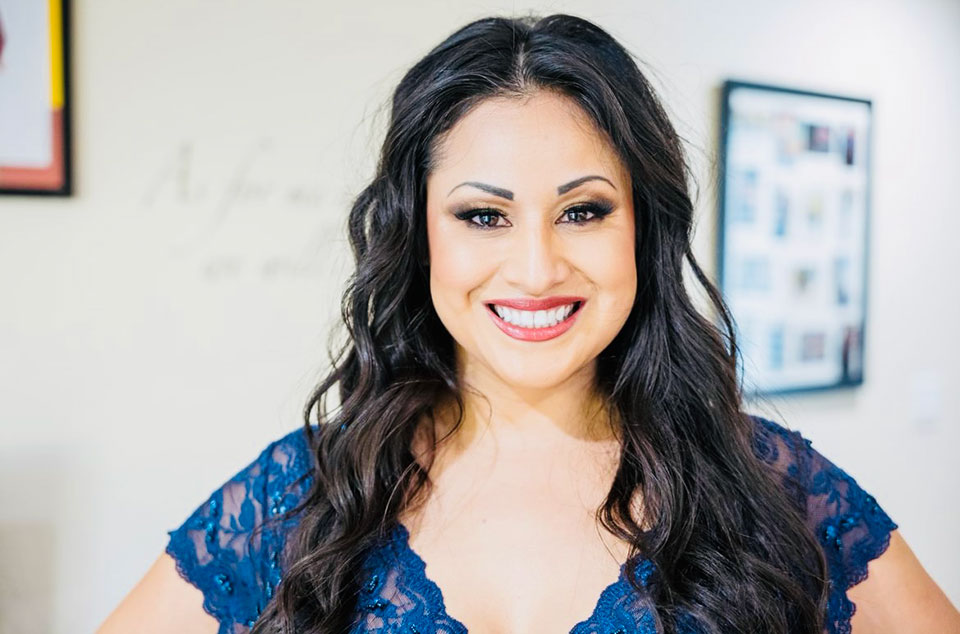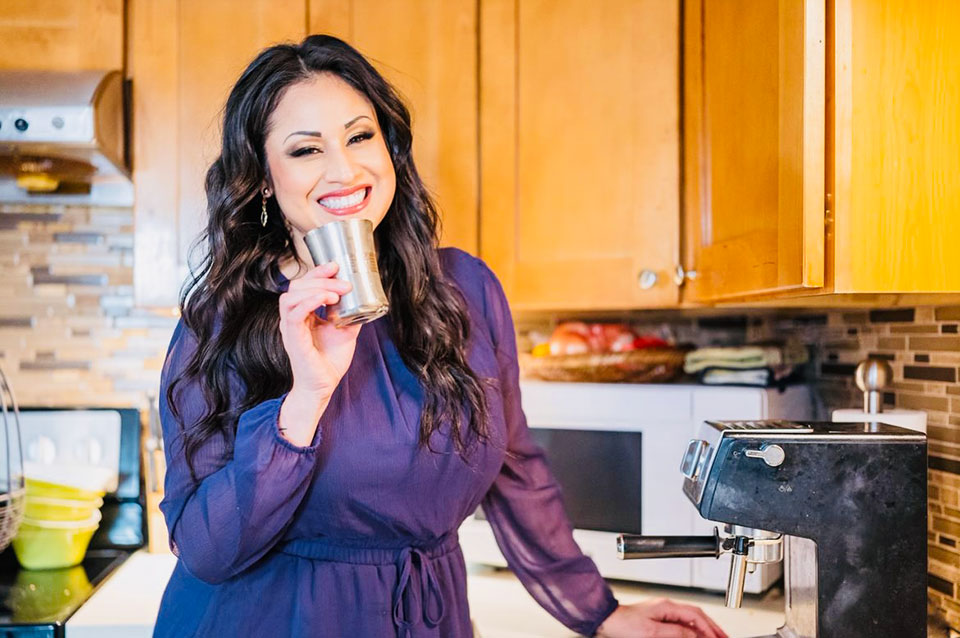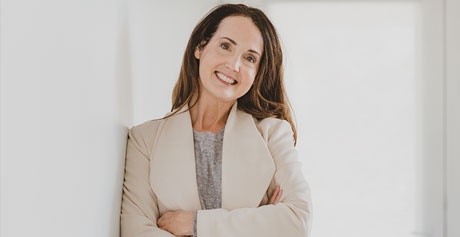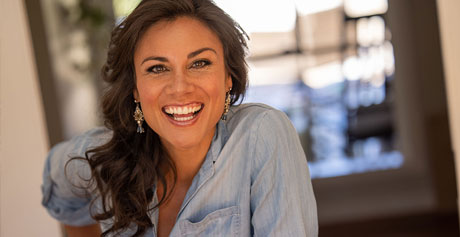She Helps Driven Women Breakthrough Their Alcohol Dependency Without AA. Read Our Exclusive Interview With Alcohol Recovery Coach Gina Kunadian

Q: What was your turning point when you knew you had to quit alcohol?
GK: Even though I relapsed many times, I have been doing all the programs you can think of in order to quit drinking. I’ve done inpatient and outpatient programs, rehab, AA, and my turning point was when I ended up in the hospital in 2017. I was already drinking a ⅕ of vodka a day. That is what I needed in order to function. My youngest son’s father and I were splitting, and I was in the process of moving out. As I was packing, I felt this excruciating pain from my lower abdomen to my upper torso and I kept vomiting. Now this pain was something I had never felt in my life, almost worse than childbirth. I wound up staying in my new place that evening and I could not sleep whatsoever because the pain was escalating. That morning, I called my son’s father to pick me up and take me to the ER. The nurses took out the wheelchair when I arrived because I couldn’t walk anymore. They gave me morphine for the pain and did multiple tests on me. They couldn’t figure out what was wrong with me until one doctor suggested I have a CAT scan, and that’s when they found out I had pancreatitis. Pancreatitis is a condition that affects the pancreas, the organ that sits behind the stomach and helps the body digest food. Large consumption of alcohol changes the way the pancreas works and increases the protein secretion of acinar cells in the pancreas. The fluid becomes viscous and can form debris that clogs the pancreatic duct and triggers pancreatitis.
Anyway, they told me I had to stay in the hospital to recover. When my doctor came to see me, she had a serious talk with me and explained the severity of my condition. She said to me “You are very, very ill. If you continue drinking you are going to die in the next 10 years. Please promise me you will never ever drink again.” And she told me to cross my heart, and all I could think about was my children losing their mother to a disease that was curable. A week later, I was released from the hospital, and I remember coming home emptying the last bottle of vodka that was in my freezer. It was at that moment I had made the decision to never drink again. My children are my world and I would do anything for them.
Q: How has the withdrawal process been for you after you quit?
GK: Luckily, I was detoxed at the hospital while being treated for pancreatitis. So, instead of having to deal with the shakes, sweats, nausea, and anxiety on my own, I was treated with the proper care. They gave me morphine and dilaudid for my pain. I was hooked up to an IV for rehydration and replacement of key electrolytes, such as calcium, magnesium, and potassium. They took blood samples constantly to monitor my amylase and lipase levels. My diet was very strict, only liquid, then eventually soft liquid foods like yogurt and pudding. Even though my detox period wasn’t too bad, the first several months of recovery were difficult. I experienced PAWS, which is post-acute withdrawal syndrome. I had low energy, insomnia, muscle pain, forgetfulness, sadness and just overall spaciness. I coped by exercising more, keeping myself busy and on a schedule. I actively participated in volunteer work, and after 3 months, I was feeling much better.
Q: Do you still have cravings for alcohol?
GK: I can proudly say that I NO longer crave any alcohol. As a matter of fact, one time I ate a tiramisu dessert that contained alcohol, and my body rejected it immediately. I can’t even have candy with alcohol flavors like bourbon butterscotch. Even though there is no alcohol inside it, my stomach turns immediately and I want to throw up. The only thing I crave all the time is chocolate ha-ha!
Q: What would you say for those who want to quit alcohol?
GK: I would tell them to stop thinking about it and just do it! The sooner their sobriety journey starts, the sooner they can achieve their goals. Of course, there will be hiccups. Relapse is very common in the first year of sobriety. It does not mean failure, as long as they learn the lesson, it actually strengthens their sobriety. Having awareness of their triggers and knowing how to cope with them definitely helps as well. Also, they want to make sure to surround themselves with people who inspire them instead of hanging around old drinking buddies who are a bad influence.
Q: What about drinking around the holidays?
GK: Unfortunately, alcohol is around us everywhere we go. Many of us can say that alcohol is featured everywhere during the holidays. From company parties, family gatherings to an evening downtown, alcohol is available. Thank goodness I no longer have any temptation to drink during the holidays. What’s incredible is that people are starting to drink less and become what they call “sober curious.” They are becoming more mindful of their drinking and want to make small positive changes to their drinking habits. The mindful, more moderate approach involves bringing awareness to each glass and a bit more consideration to your behavior and motivation around alcohol. Here are 5 ways you can reduce your alcohol consumption during the holidays.
- Make sure you have a plan of departure before the monsters come out, you don’t want to get influenced and pressured to drink.
- Try soberly socializing and get out of your comfort zone. Speak and engage with people minus the booze. This will build your confidence and your body will thank you for no hangxiety the next morning.
- Make excuses why you can’t drink. You can say that you are on medication that is contraindicated with alcohol or you can say that you have to be somewhere super early the next morning.
- Drive yourself to the event so that way you have a legitimate excuse for why you aren’t drinking or limiting the amount of alcohol you intake.
- Give yourself grace if your plans fail. The point is to bring awareness to your alcohol consumption. Aim for progress and never perfection.

Q: What are the major health benefits to quitting alcohol for good?
GK: Well, you immediately reduce your risk of serious illness. Just like when I had pancreatitis and was hospitalized. Have I experienced that since I became sober? Absolutely not! You also reduce your risk of dangerous conditions such as cirrhosis of the liver, heart disease and stomach ulcers. You do maintain a youthful appearance because you are sleeping better and not dehydrating your skin by drinking alcohol. And you also protect your reproductive health when you don’t drink, since even mild drinking has shown to decrease a woman’s chances of conceiving a baby.
Q: How has quitting alcohol changed your relationship with friends?
GK: In the beginning of my sobriety journey, it wasn’t as difficult as I thought it would be. My friends who I used to drink with were supportive and never pressured me to do anything I didn’t want to do. I was very selective about where I would go, and I eventually stopped going to nightclubs and lounges because they no longer interested me . There are only a handful of close friends I still communicate with. Those are the ones who have seen me at my worst, and now are so happy to see me at my best. The interesting part of it was that I wasn’t really seeking new friendships. I wanted to learn more about myself. Who is Gina? What things does she enjoy doing? I got involved in many different activities, such as Orangetheory fitness, sober retreats, serving the homeless, women’s Bible study and serving the children’s ministry at my church. And because I was very much involved, I met many like-minded people who eventually became my new friends. I actually met my husband doing street ministry and that was a huge blessing!
Q: How has alcohol changed relationships with family members?
GK: The crazy thing is, I hid the severity of my drinking from my family. They would see me drinking at family functions but they never knew I had a problem until I finally admitted I did. Now, within my own household, my husband was codependent and enabled me. He was my drinking buddy at home and if I wanted him to get bottles of liquor from the store, he would never hesitate. Unfortunately, we would end up fighting so badly that the police had to come to our home a couple of times. Alcohol destroyed our marriage. He was fed up with my irrational behavior and wound up taking our 6-year-old son and leaving me.
Q: What would you say to your children about the dangers of alcoholism?
GK: I think they heard all the horror stories of when “mommy” used to drink, that they’re now fearful of drinking alcohol. One is a teenager and the other is just 7. I have shared my personal story with my older son, and explained the dangers of what alcohol does to the body. I have also taught him what to do if he were to ever get pressured into drinking. I asked him if he remembers when I used to drink, and he said he was too young to remember. I am pretty sure he remembers the fights his dad and I used to have though. The younger one sees me working and helping women in their alcohol recovery. I explain to him what I do and why I do it. He’s so cute, always with a smile on his face saying “you are doing a good thing mommy." This brings tears of joy to me, because if I'd continued that path of drinking they would never get to experience what they'd have with their mother.
Q: What do you do about peer pressure?
GK: I was never really pressured into drinking. If someone did kindly offer me a drink at a party or event, I would just tell them “No thank you,” and that was that. I also wouldn’t put myself in environments that were full of booze. Some ways that you can cope with peer pressure, especially if you are in a room and everyone is chanting your name with encouragement to drink, is to first be mindful of the situation. Pay attention to the situations that you put yourself in and know they could be avoided all together. Next, just walk away. Try not to be afraid and take that moment to separate yourself from the situation. And If you are in a situation where everyone is expected to drink, find a red solo cup and fill it with soda, water, or any non-alcoholic option.
Q: What made you turn to religion after alcoholism?
GK: After having tried everything to get sober and failing, I lost all hope. I felt trapped and afraid that I would never get rid of my disease. One day before work, I stopped at my local liquor store and purchased a small bottle of diet coke and a pint of vodka. My routine before work was to park in a parking lot, then pour out half of the bottle of soda and then pour vodka inside. I remember sobbing in my car drinking and then literally gagging and throwing up. I had all these plastic grocery bags in the back in case I got sick. The sad part was that even though I was throwing up, I continued drinking because my body needed it in order to drive properly. Crazy, right? Well, in my car I started praying to God, crying out “Please help me! I don’t want to live like this anymore!” I was sick and tired of my sickness and I felt He was the only hope. It wasn’t too long after that I’d suffered pancreatitis. I was hospitalized at O’Connor Hospital, which is a faith-based hospital. My doctor, who had given me that heart to heart, wore this beautiful cross necklace. When she was talking to me, all I could do was stare at it. Even a chaplain came to pray for me. It was clear to me what was going on, it was an act of God. It was by His mercy and by His grace I am sober and I live according to His will now. My old self had to die. I go to church to worship regularly, I fellowship, as well as serve, and have finally found joy once again.
Q: What would you say to those who've quit and then started drinking again?
GK: I would tell them to not give up and to keep trying. Relapse is part of recovery, but it doesn’t mean failure, and if they have learned the lesson, it will only strengthen their sobriety. I would also ask them to take a look at their triggers. A trigger, in sobriety terms, is something that puts the urge to drink in our heads. Now, these can be external triggers like people, places, things, and situations. Or it can be internal triggers, which are feelings, thoughts, and emotions. Once they identify their biggest risk factors, they can come up with a plan of attack or simply avoid them altogether. I would also suggest getting a mentor or an accountability partner. An accountability partner will motivate them to make changes in life that promote their overall health in sobriety and recovery. They will also remind them about their commitment to avoiding alcohol and will keep them on track, especially in tempting situations. We don’t have to be alone in our sobriety journey, there are many people out there who are looking for a community to build new and sober relationships.

